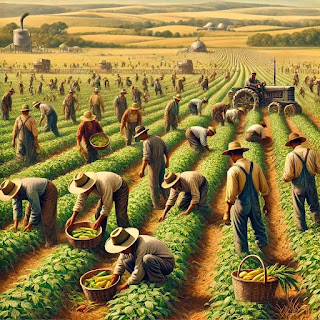How to Prepare for the Impact of Farm Policy Changes
Farmers across the country are facing significant challenges due to recent policy changes. In addition to uncertainty surrounding grants and loans, two major shifts are making it even harder for them to stay afloat:
- Tariffs and Trade Issues – We can expect an impact either in the cost of food or the tax-payer subsidies to farmers. During the 45th administration, tariffs led to reduced international purchases of U.S. agricultural products. This caused financial losses for farmers, and the government had to step in with hundreds of millions in extra subsidies to offset the damage.
- Executive Order on Inflation Reduction Act – Last week, the 47th administration signed an executive order modifying the Inflation Reduction Act, cutting climate-related grants that helped farmers manage flooding, erosion, drought, and irrigation needs.
Why This Matters
Farmers in the Midwest and around the nation are under extreme distress. According to PBS andmultiple other sources, the suicide rate is highest among farming populations due to financial pressures, physically demanding labor, unpredictable crop yields, and limited access to mental health services.
Additional pressures are expected due to:
- Increased ICE raids, which could further disrupt the agricultural workforce.
- Tariffs on food imports from Mexico and Canada, which may drive up grocery costs and reduce available food supplies.
- Retaliatory tarriffs on our agricultural goods will impact them further.
What Can We Do?
Contact Your Representatives
One of the most effective ways to push back against harmful policies is to contact your federal and state representatives.
- Urge Congress to reinstate climate grants that help farmers adapt to extreme weather conditions.
- Encourage state legislators to ensure that your state's farmers still have access to critical funding.
Find your representatives here:
- U.S. Senators & Representatives – www.congress.gov/members
- Pennsylvania State Legislators – www.legis.state.pa.us
Prepare for Food Supply Disruptions
Whether you're new to growing food or looking to expand your skills, now is a good time to prepare:
✅ Learn to Grow Your Own Food
- A book my husband loved when he began our little homestead 20 years ago was "Country Wisdom and Know How" and has been republished in 2017 with up to date information and resized to fit on a shelf! As much as I love an ebook, this is one of those references I do recommend as a real book.
- Join a Master Gardener Seed to Supper program, which offers low cost (free for certain income levels) courses on basic gardening skills. In my area, Butler County Extension will host one this spring.
- Penn State Extension (Butler County) – https://extension.psu.edu/butler-county
- Consider container gardening or raised beds if you have limited space or even ask neighbors if you can use a plot of their land for free or a small fee.
✅ Preserve Your Food
- Learn to can, dehydrate, and freeze-dry produce to store for the long term.
- Look into food preservation classes at your local extension office or community center.
- National Center for Home Food Preservation – https://nchfp.uga.edu
- National Center for Home Food Preservation – https://nchfp.uga.edu
If you’re new to keeping chickens, Backyard Chickens has a ton of information on budget-friendly coop setups and how to care for your flock:
- Backyard Chickens Community & Guides – https://www.backyardchickens.com
✅ Stock Up on Long-Term Food Storage
- Consider ReadyWise food kits, which have a 25-year shelf life. Costco is running a sale through February, and they continue to support DEI (Diversity, Equity, and Inclusion) in their business practices.
- ReadyWise Food Kits – https://readywise.com
- Costco Emergency Food Supplies –https://www.costco.com/emergency-food.html
- Amazon Readywise Kits - https://amzn.to/40K19QA
Final Thoughts
These policy changes will have long-term consequences for food security, pricing, and farming communities. We can support our local farmers, push for smarter policies, and take proactive steps to make sure our own households are prepared for whatever comes next.
[Images created with AI]



No comments:
Post a Comment